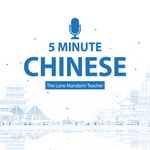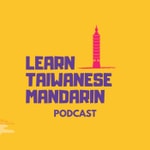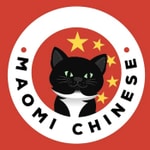五分钟中文 5 Minute Chinese – Détails, épisodes et analyse
Détails du podcast
Informations techniques et générales issues du flux RSS du podcast.

五分钟中文 5 Minute Chinese
The Lone Mandarin Teacher
Fréquence : 1 épisode/7j. Total Éps: 148

《五分钟中文》是一档每两周更新的播客节目,用简单易懂的中文聊学习和生活中的事。作为一名高中中文老师和语言爱好者,我会分享有趣的、贴近生活的中文内容,让你听得懂、学得会,还能乐在其中!每集播客的描述里都有中英文介绍,同时也免费提供有文稿和常用表达,你也可以联系我获取。
希望能让你的中文学习变得更有趣!如果有问题或建议,随时给我发邮件: TheLoneMandarinTeacher@outlook.com。
5 Minute Chinese is a biweekly podcast show that talks about all things in life in authentic yet comprehensible Mandarin. As a high school Mandarin teacher and language enthusiast, I explore fun, real-life experiences in the Mandarin language that you can relate, understand, learn and enjoy! Scripts and useful expressions can be found in the description of each Mandarin episode or by request.
I hope I can help you have more fun learning Chinese. If you have any questions or suggestions, you can email me at TheLoneMandarinTeacher@outlook.com.
Best,
The Lone Mandarin Teacher
Classements récents
Dernières positions dans les classements Apple Podcasts et Spotify.
Apple Podcasts
🇫🇷 France - languageLearning
16/09/2024#87🇫🇷 France - languageLearning
15/09/2024#94🇫🇷 France - languageLearning
14/09/2024#54
Spotify
Aucun classement récent disponible
Liens partagés entre épisodes et podcasts
Liens présents dans les descriptions d'épisodes et autres podcasts les utilisant également.
See all- https://www.buzzsprout.com/1868166/support
149 partages
- https://www.maayot.com/
72 partages
- https://youtu.be/aCgP8BFjrw4
2 partages
Qualité et score du flux RSS
Évaluation technique de la qualité et de la structure du flux RSS.
See allScore global : 53%
Historique des publications
Répartition mensuelle des publications d'épisodes au fil des années.
对看剧学中文的补充思考 Additional Thoughts on Learning Chinese with Shows
Épisode 145
dimanche 1 septembre 2024 • Durée 06:11
(本播客的简介有简体中文和英文。您可以在下方找到英文版本。 This podcast description is available in both Simplified Chinese and English. You can find the English version below.)
(中文简介)
大家好,欢迎收听新一期的《5分钟中文》。在这期节目中,我想继续分享关于通过看电视剧学习中文的想法。上期节目我提到,电视剧中的对话对语言水平要求很高,尤其是对初学者来说,可能会感到有些挑战。今天,我补充了几点建议:首先,选择带有中文字幕的剧集可以帮助理解和练习发音;其次,利用字幕做听写练习也是提高中文的好方法。此外,学习时不必追求完美,可以适当提高进度,以便接触更多的语言现象,提升学习效果。希望这些建议能对大家有所帮助。
(English Description)
Hello everyone, welcome to the latest episode of "5-Minute Chinese." In this episode, I continue to share my thoughts on learning Chinese through watching TV dramas. Last time, I mentioned that the language in dramas can be quite advanced and challenging, especially for beginners. Today, I’m adding a few more tips: First, choosing shows with Chinese subtitles can help with understanding and practicing pronunciation; second, using subtitles for dictation exercises is a great way to improve your Chinese. Additionally, there’s no need to aim for perfection—progressing through lessons at a faster yet comfortable pace allows you to encounter and reinforce more language features. I hope these suggestions are helpful to you.
由于篇幅限制,我无法在此处附上完整文稿。但是,如果您需要文稿,请随时给我发电子邮件,我很高兴把稿子发给您!
Due to space limitations, I am unable to include the full transcript here. However, if you need the transcript, please feel free to email me at thelonemandarinteacher@outlook.com, and I’ll be happy to send it to you!
It's truly an honor that my podcast can provide help and value to you. Your support and engagement mean the world to me. If you like 5 Minute Chinese, please help me by subscribing, liking, and sharing the show so that it can help more people. Thank you for your support. If you have any questions, you can email me at TheLoneMandarinTeacher@outlook.com.
通过看剧学语言的想法 My Thoughts on Learning Languages Through Watching Shows
Épisode 144
samedi 24 août 2024 • Durée 07:50
(本播客的简介有简体中文和英文。您可以在下方找到英文版本。 This podcast description is available in both Simplified Chinese and English. You can find the English version below.)
大家好!欢迎收看新一期的《五分钟中文》。在本期节目中,我将讨论通过看电视节目学习语言的利弊。虽然它通常被视为一种有趣且快速的学习方式,但它可能并不适合所有人,尤其是初学者。我介绍了“comprehensive input可理解输入”的概念,它指的是大部分可以理解但有一些新元素的语言材料。我分享了我看日本电视剧(名为《地面师たち》)的个人经历,并解释了为什么由于我目前的熟练程度,它没有显著提高我的日语水平。我还建议专注于与您的语言水平相匹配的听力材料,以使“磨耳朵”(听力训练)更有效。此外,我还谈到了 Maayot,这是一个通过适合水平的内容学习中文的有用网站。最后我谈到我制作这个播客的初衷就是提供简单而自然的语言输入,帮助学习者有效地练习。如果您觉得《五分钟中文》有用,请订阅、分享和支持这个播客!如果您想支持本播客,下方也有链接。感谢您的收听!祝您有美好的一天!
Maayot 是一个很棒的中文学习网站,提供带拼音的每日阅读、英文翻译、录音的专业反馈和阅读理解问题。它是提高中文学习的超棒的资源。这是Maayot的网站 https://www.maayot.com/。请去试试看,相信你会喜欢的!
Hello everyone! Welcome to a new episode of “Five Minute Chinese.” In this episode, I discuss the pros and cons of learning languages by watching TV shows. While it's often seen as a fun and fast way to learn, it may not be suitable for everyone, especially beginners. I introduce the concept of 'comprehensive input,' which refers to language materials that are mostly understandable with some new elements. I share my personal experience of watching a Japanese drama (called 地面師たち or Tokyo Swindlers) and explain why it didn't significantly improve my Japanese due to my current proficiency level. I also recommend focusing on listening materials that match your language level to make '磨耳朵' (ear training) more effective. Additionally, I talk about Maayot, a useful website for learning Chinese through level-appropriate content. My goal with this podcast is to provide simple yet natural language input to help learners practice effectively. If you find 5-Minute Chinese helpful, please subscribe, share, and support the show. You can find the support show link below. Thank you. Have a great day!
Maayot is a wonderful Chinese learning website that offers daily readings with pinyin, English translations, professional feedback on your recordings, and reading comprehension questions. It’s a fantastic resource for enhancing your Mandarin Chinese learning. Check it out here: https://www.maayot.com/. You'll enjoy it!
由于篇幅限制,我无法在此处附上完整文稿。但是,如果您需要文稿,请随时给我发电子邮件,我很高兴把稿子发给您!
Due to space limitations, I am unable to include the full transcript here. However, if you need the transcript, please feel free to email me at thelonemandarinteacher@outlook.com, and I’ll be happy to send it to you!
It's truly an honor that my podcast can provide help and value to you. Your support and engagement mean the world to me. If you like 5 Minute Chinese, please help me by subscribing, liking, and sharing the show so that it can help more people. Thank you for your support. If you have any questions, you can email me at TheLoneMandarinTeacher@outlook.com.
耳朵怎么又发炎了??Ear infection again??
Épisode 136
dimanche 5 mai 2024 • Durée 04:30
(If you notice the texting link above, it seems that my hosting site Buzzsprout is testing a new feature without creators enabling it: Buzzsprout's latest feature delivers listener love straight to your phone — Fan Mail! We dive into how we've been secretly testing this new tool and how you can turn it on for your own podcast. I don't know how it will work otu)
Hello everyone! Welcome to another episode of "5 Minute Chinese." Today, I'm sharing a recent health condition. A few days ago, I noticed some discomfort and pain in my ear. Given my history of outer ear infection last year, I feared it might be a recurrence. Visiting the doctor after class on Tuesday, I learned that this time, the infection was inside the ear, requiring oral antibiotics instead of just ear drops. The doctor suggested it might be due to allergies, causing mucus buildup in my nasal cavity, leading to ear inflammation. Grateful for seeking timely medical attention this time, unlike last year when I endured severe pain before seeking help, I am confident that with proper medication, my condition will improve soon. Lastly I stress the importance of managing allergies to prevent such complications. Remember, taking care of yourself is essential!
Due to space constraints, I'm unable to include the transcript here. However, if you'd like a copy, please feel free to email me, and I'll happily send it your way. Additionally, if you have any questions or comments, don't hesitate to reach out. Wishing you all a fantastic day!
It's truly an honor that my podcast can provide help and value to you. Your support and engagement mean the world to me. If you like 5 Minute Chinese, please help me by subscribing, liking, and sharing the show so that it can help more people. Thank you for your support. If you have any questions, you can email me at TheLoneMandarinTeacher@outlook.com.
放雪假: A "Snow" Day Long Weekend ❄️
Épisode 47
mardi 25 janvier 2022 • Durée 03:37
Hello everyone! In today's Mandarin episode, I talk about my past 3-day weekend due to a late-coming "snow day." See script and useful expressions below.
大家好!欢迎收听。今天想跟大家聊聊我刚刚过去的长周末。一说长周末,你马上就想:为什么你会有长周末呢?最近也没有什么节假日啊?我上周末多了一天,是因为我们星期五放雪假停课了。雪假就是Snow Day。是应该下雪才有的假。当时,天气预报说上星期五可能会下冻雨和雪。气温也会在零下。这样的话,下的雨雪就会在道路上和电线上结冰,造成交通安全问题,也有可能会造成一些地方停电。所以为了安全起见,学校决定星期五放假。但是其实我们星期五没有下雪。只是下了雨,白天的最低气温也在零上。直到星期五半夜才下,星期六我起来的时候发现地上有雪。
周末多一天好像不多,但是其实给人感觉很不一样。我觉得平时两天的周末就过得很快,什么都没干就又到周一了。但是如果多一天,变成三天,周末就感觉多了不止一天。这个周末我做了很多事:我看了一本新书,玩了手(机)游(戏),做了好吃的饭菜,跟朋友和父母聊天,还(准)备了课,还睡了美美的懒觉。真的是一个很舒服的周末。多出来的一天让我感觉有更充裕的时间做很多自己喜欢的事情。又不觉得很“赶”。这个长周末虽然外面阴雨天,天气很冷,但是我提前在周三去了超市,囤了吃的东西,所以就一直在家不出门也没关系。
通过这次,我感觉我可以理解“四天工作日”的提议了。多一天真的给人很不一样的感觉。休息好了,有更多的自由时间,我们在工作日学习和工作的时候也可以更有效率。
你们那儿下雪的时候会放雪假吗?要下多大的雪才会放假呢?我们在南方,所以一点儿雪就会放假。但是在北方,大家可能觉得没关系。可以正常上学,正常去工作。
好了。今天就跟大家聊到这里。希望你有美好的一天。再见。
- | 节假日 | Jiéjiàrì: holidays & vacations
- | 雪假 | xuě jiǎ: snow day
- | 停课 | tíngkè: cancel classes
- | 冻雨 | dòngyǔ: freezing rain
- | 气温零下 | qìwēn língxià: temperature below zero
- | 道路 | dàolù: road
- | 造成 | zàochéng: cause
- | 交通安全 | jiāotōng ānquán: traffic safety
- | 停电 | tíngdiàn: loss of power
- | 为了安全起见 | wèile ānquán qǐjiàn: for safety reasons
- | 备课 | bèikè: (teachers) prepare for classes
- | 睡懒觉 | shuìlǎnjiào: sleep in
- | 充裕 | chōngyù: rich, abundant
- | 赶 | gǎn: rushed
- | 囤 | dùn: store up
- | 理解 | lǐjiě: understand
- | 提议 | tíyì: propose, proposal
- | 自由时间 | zìyóu shíjiān: free time
- | 效率 | xiàolǜ: efficiency, productivity
- | 正常 | zhèngcháng: normal
- | 希望 | xīwàng: hope
It's truly an honor that my podcast can provide help and value to you. Your support and engagement mean the world to me. If you like 5 Minute Chinese, please help me by subscribing, liking, and sharing the show so that it can help more people. Thank you for your support. If you have any questions, you can email me at TheLoneMandarinTeacher@outlook.com.
原神(Genshin Impact)是什么游戏?好玩吗?
Épisode 46
jeudi 20 janvier 2022 • Durée 04:26
Hello everyone! In this Mandarin episode, I talk about Genshin Impact (原神), an open-world action game I started playing last weekend at the recommendation of my students. What is the theme of Genshin Impact? And why do I like the game? Let's find out.
大家好,欢迎收听。今天想跟大家聊一个我最近开始玩的游戏,叫《原神》,英文名字叫Genshin Impact。我在中文的社交媒体上见过这个游戏的广告,而且我有几个八年级的学生也都在玩。他们就一直跟我推荐这个游戏,让我一定要玩。上周末正好是(MLK)长周末,所以我就有时间好好地玩了这个游戏。
《原神》是由上海“米哈游”(公司)制作发行的一款开放世界角色冒险游戏。在游戏开始的时候,旅行者兄妹——哥哥“空”和妹妹“荧”——在不同世界之间旅行(我选择了哥哥)。故事一开始,妹妹就被带走,与哥哥分离了。为了找回妹妹,哥哥从此踏上探险的旅程。他的第一站是蒙德城Mondstadt。我现在也只玩到了蒙德城的地图。我现在解锁了四个人物,最开始的旅行者哥哥,Amber,Kaeya和Lisa。我最喜欢用的是哥哥和Kaeya。
我挺喜欢这个游戏的。首先,我觉得游戏的画质很精美。人物和动作的细节处理都很不错。在广阔的地图上探索的时候,美丽的画面让人很享受。可以在新世界里通过人物体验一年四季,阴晴雨雪,顺便打怪物也不错哈。而且,不但原野很漂亮,城市做得也很漂亮。蒙德城Mondstadt应该是根据中世纪的德国城市做的。你可以去城里的饭店买外卖。也可以去酒吧坐下来喝酒,还可以去商店买卖东西。我觉得很有意思。听说下一站璃月港是根据中国古代的城市做的。我很期待自己能玩到那儿。可以体验古中国的美。我觉得这个游戏好玩的另一个原因就是人物设定。每个人物都有自己的元素属性。这里我觉得有点儿借鉴了中国文化里的“五行”:金gold、木wood、水water、火fire、土earth。这就是中国文化里的five elements—五行。比如,水“克”火。克 means defeat or against. 所以水water against 火fire。在原神游戏里一共有七种不同的元素(element),你需要知道用什么元素才能打败另一个元素的怪物。 比如,下雨的时候,或者在河边湿地,你就可以用Kaeya的冰攻击。因为怪物身上有水,你就可以把它冻住以后再攻击他。这样更有效。
总之我觉得原神是一个制作精良的游戏。如果大家最近有空的话,我推荐你下载玩一下。我也会继续玩这个游戏的。
好了。关于原神今天就跟大家聊到这里。感谢您的收听。再见。
Useful words and expressions
- | 原神 | Yuán shén: (game) Genshin Impact
- | 社交媒体 | shè jiāo méitǐ: Social media
- | 广告 | guǎnggào: advertisement
- | 推荐 | tuījiàn: recommend; recommendation
- | 制作发行 | zhìzuò fāxíng: produce & publish
- | 开放世界 | kāifàng shìjiè: open world
- | 角色冒险 | juésè màoxiǎn: character adventure
- | 旅行者 | lǚxíng zhě: traveller
- | 分离 | fēnlí: separate, set apart
- | 踏上 | tà shàng: set foot on (a journey)
- | 探险 | tànxiǎn: explore & adventure
- | 解锁 | jiěsuǒ: unlock
- | 人物 | rénwù: character, personality
- | 画质精美 | huà zhì jīngměi: high resolution (lit) picture quality delicate and beautiful
- | 动作 | dòngzuò: action
- | 细节处理 | xìjié chǔlǐ: handling of details - (lit) detail handle
- | 广阔 | guǎngkuò: wide, expansive
- | 探索 | tànsuǒ: explore
- | 画面 | huàmiàn picture
- | 享受 | xiǎngshòu: enjoy
- | 体验 | tǐyàn: experience
- | 顺便 | shùnbiàn: on the side, by the way
- | 打怪(物) | dǎ guài (wù): beat monsters
- | 原野 | yuányě: field (such as grass-covered plain)
- | 中世纪 | zhōngshìjì: Middle Ages
- | 德国 | déguó: Germany
- | 古(代) | gǔ (dài): ancient
- | 期待 | qídài: anticipate, look forward to
- | 元素 | yuánsù: element
- | 属性 | shǔxìng: characteristic
- |设定| shè dìng:setting
- | 借鉴 | jièjiàn: borrow from, build on (an idea, concept)
- | 五行 | wǔháng: (Chinese culture)Five Element
- | 打败 | dǎbài: beat, defeat
- | 湿地 | shīdì: wetland
- | 攻击 | gōngjí: attack
- | 冻 | dòng: freeze, frozen
- | 有效 | yǒuxiào: effective
- | 精良| jīngliáng: excellent, sophisticated
It's truly an honor that my podcast can provide help and value to you. Your support and engagement mean the world to me. If you like 5 Minute Chinese, please help me by subscribing, liking, and sharing the show so that it can help more people. Thank you for your support. If you have any questions, you can email me at TheLoneMandarinTeacher@outlook.com.
The Chinese “班” VS The US “class”
Épisode 45
samedi 15 janvier 2022 • Durée 05:03
In this Mandarin episode, I explore the word 班/class. If you are a Mandarin student, this word is probably among the first that you learned. But have you ever thought of the socio-cultural concept of 班/class in a real school experience?What is a class in the US school context vs a 班 in a Chinese school? Let's find out!
(script)
大家好,欢迎收听。今天想跟大家聊“班”这个词。班被翻译成class。但是翻译并不能让我们很好地认识社会文化上”班“的差别。所以下面我会用我自己的经历来对比中国和美国,从而解释“班”这个词。
说中国的班/class的概念以前,我们先说说美国的班/class。在美国小学和幼儿园阶段,学生们每天都是跟自己的“班”在一起学习,吃饭,活动。比如我在的学校,五年级分成两个班。每个班的课程表是不一样的,但是每个班里的学生的课(程)表都是一样的。每个班每天学的的东西也是一样的。两个班不在一起学。但是到了初、高中阶段,每个学生的课程表就都不一样了。因为每个学生可以根据自己的需要安排自己每周的课程。这样他们就可以选自己喜欢的,适合上的课。每个人都有自己的课表,很少有人的课表跟另外一个人的完全重合。
那中国的情况呢?中国的学校都是以班为单位上课、组织活动的。如果你去一个中国的高中,你会看到有教室门口都挂着牌子。上面写着班级的名字,比如“高三4班”。就是高中三年级的第四个班。 中国学校会在所有学生刚进入小学,初中和高中的时候进行分班。分班以后一般不会再进行大的调整。所以一个中国学生在整个小学,初中或者高中阶段,都是在同一个班,跟一样的同学一起学习,生活。高中三年,一个班的同学就一起学习生活三年。像美国的小学的班,每个班的课程表是不一样的,但是每个班里的学生的课表是一样的。大家一起上课,活动。
中国学校里每个班的教室也是固定不变的。同一个班的学生每天都会在自己班的教室等不同课的老师来上课。对比在美国,教室的牌子上不是班的名字,而是老师的名字。美国老师会一直在自己的教室教课,备课,改作业,判卷子,学生只在有这个老师的课的时候才会来这个教室上课。对比在中国,老师会在教师办公室工作。因为教室是一个班的学生学习的地方,不是老师工作的地方。中国教室可以说是学生的home base。老师只是来上课的。
现在我们回到班/class的定义,你就可以理解,美国人说的class和中国人想的班是不一样的。美国人说的class——特别是初中,高中的时候——指的是一个grade level cohort。比如the senior class。可是中国人说“班”,说的是一个“什么活动都一起做,什么课都一起上”的团体。中文说“我们班”指的是几年朝夕相处的一群人的概念。正因为如此,所以中国人对一个“班”的同学的感情可能会更深一些。而因为美国初高中学生因为课程组织安排的差异,很少会有这样的经历。
好了,今天跟大家聊了聊班这个定义。希望大家喜欢。再见!
Useful words and expressions
- | 翻译 | Fānyì: translate
- | 并 | bìng: not at all
- | 社会文化 | shèhuì wénhuà: society & culture
- | 差别/异| chābié/yì : difference
- | 经历 | jīnglì: experience
- | 从而 | cóng'ér: thus, thereby
- | 概念 | gàiniàn: concept
- | 阶段 | jiēduàn: stage
- | 分成 | fēnchéng: divide, categorize into
- | 课(程)表 | kè (chéng) biǎo: class schedule
- | 根据…需要 | gēnjù…xūyào: based on ... need
- | 重合 | chónghé: overlap
- | 情况 | qíngkuàng: situation, circumstance
- | 以…为单位 | yǐ…wèi dānwèi: treat ... as a unit
- | 牌子 | páizi: sign,
- | 调整 | tiáozhěng: adjust
- | 整个 | zhěnggè: the whole, entire...
- | 生活 | shēnghuó: live, life
- | 固定不变 | gùdìng bù biàn: set and unchanged
- | 而 | ér: however
- | 改作业 | gǎi zuòyè: check and give correction on homework
- | 判卷子 | pàn juànzi: grade exams
- | 定义 | dìngyì: define, defination
- | 理解 | lǐjiě: understand, comprehend
- | 朝夕相处 | zhāoxìxiāngchǔ:
- | 正因为如此 | zhèng yīnwèi rúcǐ: exactly because of this
- | 感情 | gǎnqíng: emotions, feelings
It's truly an honor that my podcast can provide help and value to you. Your support and engagement mean the world to me. If you like 5 Minute Chinese, please help me by subscribing, liking, and sharing the show so that it can help more people. Thank you for your support. If you have any questions, you can email me at TheLoneMandarinTeacher@outlook.com.
中国的天气怎么样?What's the weather like in China?
Épisode 44
mercredi 12 janvier 2022 • Durée 04:46
In this Mandarin episode, I talk about China's weather: is it winter or summer in China now? What's the weather like in China? Is China cold or hot? Script and useful expressions can be found below.
(Script)
大家好,欢迎收听。今天跟大家聊聊中国的天气。有时候会有美国朋友问我,中国现在什么季节?跟我们(美国)一样吗?现在也是冬天吗?中国冷不冷?所以今天我们就说说中国的天气和气候的话题。
首先,中国在北半球。北半球现在是冬天,中国也是冬天。不过,不能因为中国和美国一样:都在北半球,就认为中国的气候和美国的气候一样。中美虽然都在北半球,但是地理位置不一样,地形地貌也不一样,所以两个国家的气候自然也就不一样了。
中国是一个国土面积很大的国家。不同地方的天气差别很大。所以不能一概而论地说中国现在的天气怎么样或者中国的气候如何。就像我们说美国天气的时候,不能说美国现在很热或者很冷。因为美国太大了。在同一天的同一个时间,可能Seattle是阴天,很冷,但是Miami却是大晴天,像夏天一样。比如,很多中国人冬天的时候会飞去海南岛过冬。海南岛是中国南部的一个岛。像美国的Hawaii,是度假胜地。海南的首都海口今天的气温是摄氏17度到21度(17-21 degrees Celsius) or 华氏64到70度(64-70 degrees Fahrenheit)。而这一天中国最北的漠河市最高气温零下18度,最低气温零下28度。(-18~-28 degrees Celsius) or 华氏最高温度零下2度,最低气温零下20度 (-2~ -20 degrees Fahrenheit)。所以你看中国南北的天气是非常不一样的,气温差很多。不只是南北,中国的东西,内陆和沿海的气候差别也很大。
我们现在来练习几个小问题吧!我说问题,然后给你十秒钟的时间回答,然后我再回答。
1. 你们那儿现在是冬天还是夏天?
A: 我住在美国现在是冬天。
2. 最近的天气怎么样?
A: 我们最近晴天,但是天气很冷。
3. 你在的城市现在气温是多少?
A: 我们今天最高47度 最低30度 (F)
4. 你喜欢你在的城市的气候吗?
A: 我挺喜欢的。因为我们冬天不冷。我很不喜欢冷。
5. 你喜欢冷的天气还是热的天气呢?
A:我比较喜欢热一点的天气。热比冷好。
Useful expressions
- | 天气 | Tiānqì: weather
- | 气候 | qìhòu: climate
- | 北半球 | běibànqiú: Northern Hemisphere
- | 冬天 | dōngtiān: winter
- | 地理位置 | dìlǐ wèizhì: Geographical location
- | 地形地貌 | dìxíng dìmào: geography, terrain
- | 自然 | zìrán: nature, naturally
- | 国土面积 | guótǔ miànjī: Land area of a country
- | 差别 | chābié: difference
- | 一概而论 | yīgài'érlùn: generalized, blanked statement
- | 同(相同) | tóng (xiāngtóng): same
- | 阴天 | yīn tiān: cloudy, overcast
- | 晴天 | qíngtiān: sunny
- | 夏天 | xiàtiān: summer
- | 过冬 | guòdōng: spend the winter season
- | 岛 | dǎo: island
- | 度假胜地 | dùjià shèngdì: resort, vacation destination
- | 摄氏度 | shèshìdù: celsius
- | 华氏度 | huáshì dù: Fahrenheit
- | 温度/气温 | wēndù/qìwēn: temperature
- | 内陆 | nèi lù: inland
- | 沿海 | yánhǎi: coastal
It's truly an honor that my podcast can provide help and value to you. Your support and engagement mean the world to me. If you like 5 Minute Chinese, please help me by subscribing, liking, and sharing the show so that it can help more people. Thank you for your support. If you have any questions, you can email me at TheLoneMandarinTeacher@outlook.com.
东西买不到,还涨价?The "New" Shopping Experience
Épisode 43
samedi 8 janvier 2022 • Durée 05:00
In this Mandarin episode (with script), I talk about buying things in this day and age: how easy is it to get what we want either online or in-store? Based on my recent experience, it's not as smooth or fast as we'd like it to be.
After talking about my recent experience, I have 5 questions that are related to today's topic. For each question, you will have 20 seconds to respond. My answers are after the 20s response time. The script and useful expressions are below. Let me know if you have any questions or suggestions.
(script)
大家好,今天想跟大家聊聊现在我们买东西的时候遇到的涨价和缺货的情况。我去年12月27号从William Sonoma的网站上买了一把厨房剪刀。我以为很快就能收到,结果我下单以后就缺货了。网站上显示要等到1月19-20号才能收到。所以我现在也没有剪刀用。真的很不方便。上一期节目跟大家说,我想换一套新的厨房家电:灶台,冰箱,微波炉。可是我问了很多店,他们都说现在没有货。我想要的的牌子,最快的也得10-14个星期。其他牌子也没有货。你们那儿也是这样吗?
我准备了五个相关问题。每个问题后面有二十秒时间给你思考回答。二十秒之后我会给我的回答。那我们现在开始吧!
1. 你喜欢网购还是去实体店买?(1:28)
我喜欢网购。不过,很多东西还是去实体店买比较好。比如衣服,可以去在店里试了再买。家具也是,还是去实地看看摸摸再买更好。
2. 你最近买了什么东西?(2:15)
我最近买了两件毛衣和一些厨房用品。都很不错。我很喜欢。
3. 你想买的东西都能买到吗?有没有缺货?(2:48)
我想买的吃的,还有生活用品都买到了。可是我买的厨房剪刀还是缺货,不知道什么时候才能收到。
4. 你等了多久才收到订购的东西?(3:28)
在Amazon网购的东西,只要有货,都很快收到了。差不多三四天吧。缺货的东西,我不知道要多久才能收到。
5. 你觉得最近东西涨价了吗?(4:06)
我觉得最近很多东西都涨价了。吃的东西涨了不少。比如我喜欢吃的chipotle,两年前的一份牛肉饭只要8 美元,现在要10.95。感觉很多大大小小的东西都贵了。
Useful expressions:
- | 遇到 | Yù dào: encounter
- | 涨价 | zhǎng jià: price increase, raise the price
- | 缺货 | quē huò: backorder, lacking stock
- | 情况 | qíngkuàng: situation
- | 剪刀 |Jiǎndāo: scissors
- | 下单 | xià dān: place the order
- | 显示 | xiǎnshì: to show, display
- | 牌子 | páizi: brand, sign
- | 没(有)货 | méi (yǒu) huò: doesn't have item, out of stock
- | 网购 | wǎnggòu: online shopping
- | 实体店 | shítǐ diàn: physical store
- | 家具 | jiājù: furniture
- | 实地 | shídì: on-site
- | 摸 | mō: touch
- | 毛衣 | máoyī: sweater
- | 厨房用品 | chúfáng yòngpǐn: kitchen supplies
- | 生活用品 | shēnghuó yòngpǐn: everyday life essentials
- | 订购 | dìnggòu: subscribe & order
It's truly an honor that my podcast can provide help and value to you. Your support and engagement mean the world to me. If you like 5 Minute Chinese, please help me by subscribing, liking, and sharing the show so that it can help more people. Thank you for your support. If you have any questions, you can email me at TheLoneMandarinTeacher@outlook.com.
中式厨房和西式厨房的区别 Chinese Kitchen VS American Kitchen
Épisode 42
mercredi 5 janvier 2022 • Durée 04:27
In this Mandarin episode, I talk about the differences between a typical Chinese kitchen and a typical kitchen in the west. First, a Chinese kitchen is not usually equipped with a full-size oven and a dishwasher like we see in an American kitchen. Secondly, a Chinese kitchen is often separated from the rest of the house by design due to the cooking smoke, which is more of a source of indoor air pollution than western-style cooking.
Some useful expressions:
- | 中式厨房 | Zhōngshì chúfáng: Chinese-style kitchen
- | 西式 | xīshì: "Western" -style (not America's West, but west hemisphere/the western world)
- | 灶台 | zào tái: stove-top
- | 微波炉 | wéibōlú: microwave
- | 家电配置 | jiādiàn pèizhì: home appliance set-up
- | 大烤箱 | dà kǎoxiāng: big oven/full-size oven
- | 洗碗机 | xǐ wǎn jī: dishwasher
- | 越来越多 | yuè lái yuè duō: more and more
- | 装 | zhuāng: install
- | 主要 | zhǔyào: main
- | 空间 | kōngjiān: space
- | 传统中餐 | chuántǒng zhōngcān: traditional Chinese food
- | 占地方 | zhàn dìfāng: take up space
- | 封闭 | fēngbì: confined, closed off
- | 开放式 | kāifàng shì: open-style
- | 单独 | dāndú: stand-alone
- | 屋子 | wūzi: room
- | 隔开 | gé kāi: separate, set apart
- | 设计 | shèjì: design
- | 跟…有关 | gēn…yǒuguān: relate to...
- | 饮食 | yǐnshí: diet, food
- | 煎炒烹炸 | jiān chǎo pēng zhà: (signature Chinese cooking methods): panfry, stir-fry, boil, deep-fry
- | 油烟 | yóuyān: cooking smoke/cooking fume
- | 污染 | wūrǎn: pollute, pollution
- | 所有 | suǒyǒu: all
- |特点| tèdiǎn:feature, trait, characteristic
- | 吸油烟机 | xīyóu yān jī: kitchen vent(ilator)/range hood
- |吸力| xīlì: extraction power
- | 烹饪 | pēngrèn: cooking (formal)
- | 产生 | chǎnshēng: produce
It's truly an honor that my podcast can provide help and value to you. Your support and engagement mean the world to me. If you like 5 Minute Chinese, please help me by subscribing, liking, and sharing the show so that it can help more people. Thank you for your support. If you have any questions, you can email me at TheLoneMandarinTeacher@outlook.com.
旅行清单 Travel Packing List
Épisode 41
jeudi 30 décembre 2021 • Durée 04:09
In this Mandarin episode, I talk about what things to bring for travel. ID, money and phone are basic essentials (0:09). Also, don't forget to bring toiletries (1:27) and a travel medicine kit (2:07). Lastly, make sure you bring appropriate clothing (3:02) according to the weather and your travel purpose.
Some useful words and expressions to put on your vocabulary packing list:
Basic Essentials (0:09)
- | 身份证明 | Shēnfèn zhèngmíng: personal ID
- | 驾照 | jiàzhào: driver's license
- | 护照 | hùzhào: passport
- | 钱包 | qiánbāo: wallet, purse
- | 信用卡 | xìnyòngkǎ: credit card
- | 现金 | xiànjīn: cash
- | 零钱 | língqián: change (money)
- | 支付 | zhīfù: payment, pay
- | 系统 | xìtǒng: system
- | 所幸 | suǒxìng: thankfully
- | 保持联系 | bǎochí liánxì: keep in contact
- | 不可或缺 | bùkě huò quē: indispensable
Toiletries (1:27)
- | 洗漱用品 | xǐshù yòngpǐn: Toiletries
- | 洗面奶 | xǐmiàn nǎi: facial cleaner
- | 牙膏牙刷 | yágāo yáshuā: toothpaste & toothbrush
- | 化妆品 | huàzhuāngpǐn: cosmetics
- | 粉底 | fěndǐ: foundation (cosmetics)
- | 眉笔 | méi bǐ: eyebrow pencil
- | 眼影 | yǎnyǐng: eye shadow
- | 洗发水护发素 | xǐ fǎ shuǐ hù fā sù: shampoo & conditioner
- | 身体乳 | shēntǐ rǔ: body lotion
- | 沟通 | gōutōng: communicate
Medicine for travel (2:07)
- | 医药用品 | yīyào yòngpǐn: medical supplies
- | 新冠疫情 | xīnguān yìqíng: COVID pandemic
- | 消毒用品 | xiāodú yòngpǐn: disinfectant
- | 酒精湿巾 | jiǔjīng shī jīn: alchohol wipes
- | 免洗洗手液 | miǎn xǐ xǐshǒu yè: hand sanitizer
- | 口罩 | kǒuzhào: face mask
- | 保健品 | bǎojiàn pǐn: dietary supplements
- | 按照 | ànzhào: according to
- | 计算 | jìsuàn: calculate
- | 药物 | yàowù: medicine
- | 布洛芬 | bù luò fēn: ibuprofen
- | 肠胃药 | chángwèi yào: Gastrointestinal medicine
- | 野外徒步 | yěwài túbù: outdoor hiking
- | 蚊虫叮咬 | wénchóng dīngyǎo: mosquito & insect stings/bites
- | 喷雾 | pēnwù: spray
- | 药膏 | yàogāo: ointment
Clothing (3:02)
- | 根据 | gēnjù: based on
- | 目的 | mùdì: purpose
- | 拍照打卡 | pāizhào dǎkǎ: take pictures and check off the list
- | 时尚 | shíshàng: fashion
- | 露营 | lùyíng: camping out
- | 登山 | dēngshān: hiking (in mountains)
- | 天气预报 | tiānqì yùbào: weather forecast
- | 安全舒适 | ānquán shūshì: safe and comfortable
It's truly an honor that my podcast can provide help and value to you. Your support and engagement mean the world to me. If you like 5 Minute Chinese, please help me by subscribing, liking, and sharing the show so that it can help more people. Thank you for your support. If you have any questions, you can email me at TheLoneMandarinTeacher@outlook.com.


